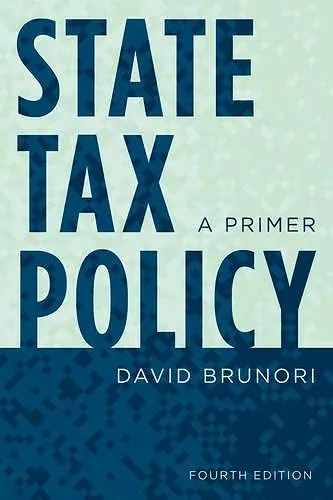State Tax Policy
A Primer
Format:Hardback
Publisher:Rowman & Littlefield
Published:26th Oct '16
Currently unavailable, and unfortunately no date known when it will be back
This hardback is available in another edition too:
- Paperback£35.00(9781442272873)

State tax systems are in trouble. Revenue collecting methods developed more than a half century ago are straining to deal with 21st century economies. Globalization and e-commerce are changing the way people work and purchase goods; devolution has steadily shifted responsibility from the federal government to the states; tax incentives have become the weapon of choice in the battle to attract business investment. All of this, in an environment where antitax messages have become a staple of political campaigns, have made creating tax policy more challenging than ever before. In the updated fourth edition of State Tax Policy, David Brunori analyzes these and other critical challenges facing state governments. He identifies the important issues, and examines possible solutions in formulating and implementing state tax policy. State Tax Policy is the only book that provides students and professionals with a concise, approachable, and up-to-date introduction to the intricacies of state tax policy.
States can manage the unprecedented fiscal challenges they face only if they have sound revenue systems. Many have systems more appropriate for economies of the past, not that of the 21st century. In this fourth edition of his classic work, Brunori examines state tax policy by postulating the basic principles for evaluating taxes (yield, economic neutrality, equity, ease of administration and compliance, and accountability), discussing the questionable (but popular) effort to use tax incentives to stimulate economic development, and exploring how politics complicates adoption of sound tax policy. He then devotes a chapter each to the special challenges confronting the major state taxes (sales and use, personal income, and corporate income taxes), plus chapters that overview other state taxes (mostly excises and property) and other state revenue. He manages to make technical and tedious problems of tax structure less arcane for non-specialists and those interested in creating productive and sound revenue systems. His concluding chapter is essentially a plea for states to pay more attention to the evidence as they restructure their taxes, and to keep their revenue systems in tune with changing economies. Summing Up: Highly recommended. Upper-division undergraduates through professionals. * CHOICE *
ISBN: 9781442272866
Dimensions: 237mm x 161mm x 17mm
Weight: 404g
176 pages
Fourth Edition